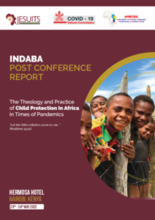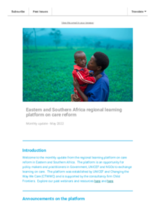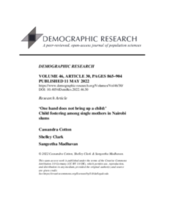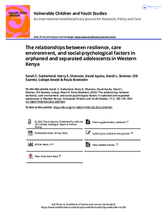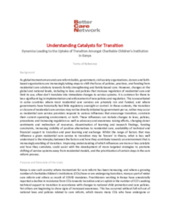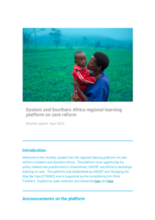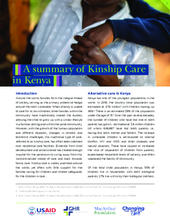This country page features an interactive, icon-based data dashboard providing a national-level overview of the status of children’s care and care reform efforts (a “Country Care Snapshot”), along with a list of resources and organizations in the country.
demographic_data
childrens_living_arrangement
children_living_without_bio
adoption
social_work_force
key_stakeholders
Key Stakeholders
Add New DataOther Relevant Reforms
Add New Datadrivers_of_institutionalisation
Drivers of Institutionaliziation
Add New Datakey_research_and_information
Key Data Sources
Add New DataChildren's Act, 2022 (Kenya)
Prevalence and number of children living in institutional care: global, regional, and country estimates
Social Protection and Disability in Kenya
Kenya Social Protection Sector Review
Country Care Review: Kenya
Child Developmental Disabilities, Caregivers’ Role in Kenya and Its Implications on Global Migration
Research findings on Alternative care system in Kenya for children without parental care
Charitable Children Institutions in Kenya: Factors Influencing Institutionalization of Children
Acknowledgements
Data for this country care snapshot was contributed by consultants with Maestral International.
Displaying 141 - 150 of 448
This report captures the learning at a two-day conference which brought together practitioners and specialists for a critical examination of the Theology and Practice of Child Protection in Africa in Nairobi on May 23 - 24, 2022.
This is the first monthly update of the Eastern and Southern Africa Regional Learning Platform published in May 2022.
Childrearing in sub-Saharan Africa is often viewed as collaborative, where children benefit from support from kin. For single mothers living in informal settlements, kin networks may be highly dispersed and offer little day-to-day childrearing support, but may provide opportunities for child fostering. This study conducted in Nairobi, Kenya, uses a linked lives approach, where single mothers’ connections with kin and romantic partners may influence whether – and what type of – kin are relied on to support child fostering.
The Eastern and Southern Africa Regional Learning Platform hosted a webinar on 11 May 2022 examining why it is important to align care systems in development and humanitarian contexts and provides practical examples from Kenya and Uganda.
Join us on the 11th of May from 11.00 - 12.30 Nairobi time to explore the importance of ensuring that care systems developed in humanitarian settings adhere to national standards and contribute to the development of national care systems. Examples from Uganda and Kenya will illustrate how care systems in refugee camps can be aligned with the national care system.
This study found a strong relationship between the care environment and resilience in orphaned and separated adolescents and youths (OSAY) in western Kenya. Care environment and resilience each independently demonstrated strong relationships with peer support, social support, and participating in volunteer activities. Resilience also had a strong relationship with familial support. These data suggest that resilience can be developed through strategic supports to this vulnerable population.
The purpose of this study is therefore to better understand these influences from the perspective of CCI directors and decision makers, what influences and what creates an enabling environment and what, if any, implications these findings have for local, national, and global care reform strategies and approaches. The consultant will be the primary person responsible for the implementation of the research project. The total length of the consultancy is 20 days.
This is the second monthly update of the Eastern and Southern Africa Regional Learning Platform published in April 2022.
An April 7 court ruling by Justice Joel Ngugi of the Nakuru law courts said fathers can be granted custody of young children.
This case study focuses on kinship care in the Kenya context.

